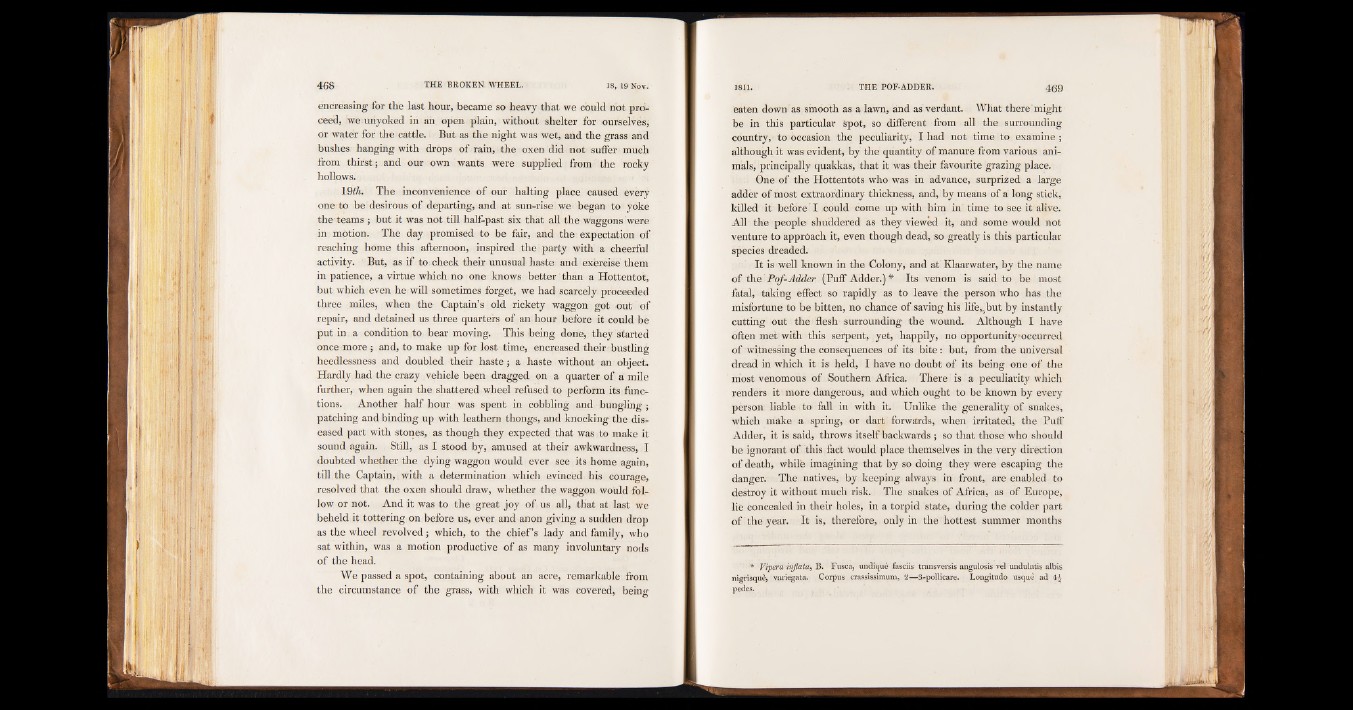
encreasing for the last hour, became so heavy that we could not proceed,
we unyoked in an open plain, without shelter for ourselves,
dr-water for the cattle. But as the night was wet, and the grass and
bushes hanging with drops of rain, the oxen did not suffer much
from thirst ; and our own wants were supplied from the rocky
hollows, e
19th. The inconvenience of our halting place caused every
one: to be desirous of departing, and at sun-rise we began to yoke
the teams ; but it was not till half-past six that all the waggons were
in motion. The day promised to be fair, and the expectation of
reaching home this afternoon, inspired the party with a cheerful
activity. But, as if to check their unusual haste and exercise them
in patience, a virtue which no one knows better than a Hottentot,
but whieh even he will sometimes forget, we had scarcely proceeded
three miles, when the Captain’s old rickety waggon got out of
repair, and detained us three quarters of an hour before it could be
put in a condition to bear moving. This being done, they started
once more; and, to make up for lost time, encreased their bustling
heedlessness and doubled their haste; a haste without an object.
Hardly had the crazy vehicle been dragged on a quarter of a mile
further, when again the shattered wheel refused to perform its functions.
Another half hour was spent in cobbling and bungling ;
patching and binding up with leathern thongs, and knocking the diseased
part with stones, as though they expected that was to make it
sound again. Still, as I stood by, amused at tbeir awkwardness, I
doubted whether the dying waggon would ever see its home again,
till the Captain,. with a determination which evinced his courage,
resolved that the oxen should draw, whether the waggon would follow
or not. And it was to the great joy of us all, that at last we
beheld it tottering on before us, ever and anon giving a sudden drop
as the wheel revolved; which, to the chief’s lady and family, who
sat within, was a motion productive of as many involuntary nods
of the head.
We passed a spot, containing about an acre, remarkable from
the circumstance of the grass, with which it was covered, being
eaten down as smooth as a lawn, and as verdant. What there might
be in this particular spot, so different from all the surrounding
country, to occasion the peculiarity, I had not time to examine;
although it was evident, by the quantity of manure from various animals,
principally quakkas, that it was their favourite grazing place.
One of the Hottentots who was in advance, surprized a large
adder of most extraordinary thickness, and, by means of a long stick,
killed it before I could come up with him in time to see it alive.
All the people shuddered as they viewed it, and some would not
venture to approach it, even though dead, so greatly is this particular
species dreaded.
It is well known in the Colony, and at Klaarwater, by the name
of the Pof-Adder (Puff Adder.) * Its venom is said to be most
fatal, taking effect so rapidly as to leave the person who has the
misfortune to be bitten, no chance of saving his life,5but by instantly
cutting out the flesh surrounding the wound. Although I have
often met with this serpent, yet, happily, no opportunityoccurred
of witnessing the consequences of its bite: but, from the universal
dread in which it is held, I have no doubt of its being one of the
most venomous of Southern Africa. There is a peculiarity which
renders it more dangerous, and which ought to be known by every
person liable to fall in with i t Unlike the generality of snakes,
which make a spring, or dart forwards, when irritated, the Puff
Adder, it is said, throws itself backwards ; so that those who should
be ignorant of this fact would place themselves in the very direction
of death, while imagining that by so doing they were escaping the
danger. The natives, by keeping always in front, are enabled to
destroy it without much risk. The shakes of Africa, as of Europe,
lie concealed in their holes, in a torpid state, during the colder part
of the year. It is, therefore, only in the hottest summer months
* Vipera iiiflata, B. Fusca, undique fasciis transversis angulosis vel undulatis albis
nigrisque, variegata. Corpus crassissimum, 2—3-pollicare. Longitudo usque ad
pedes.